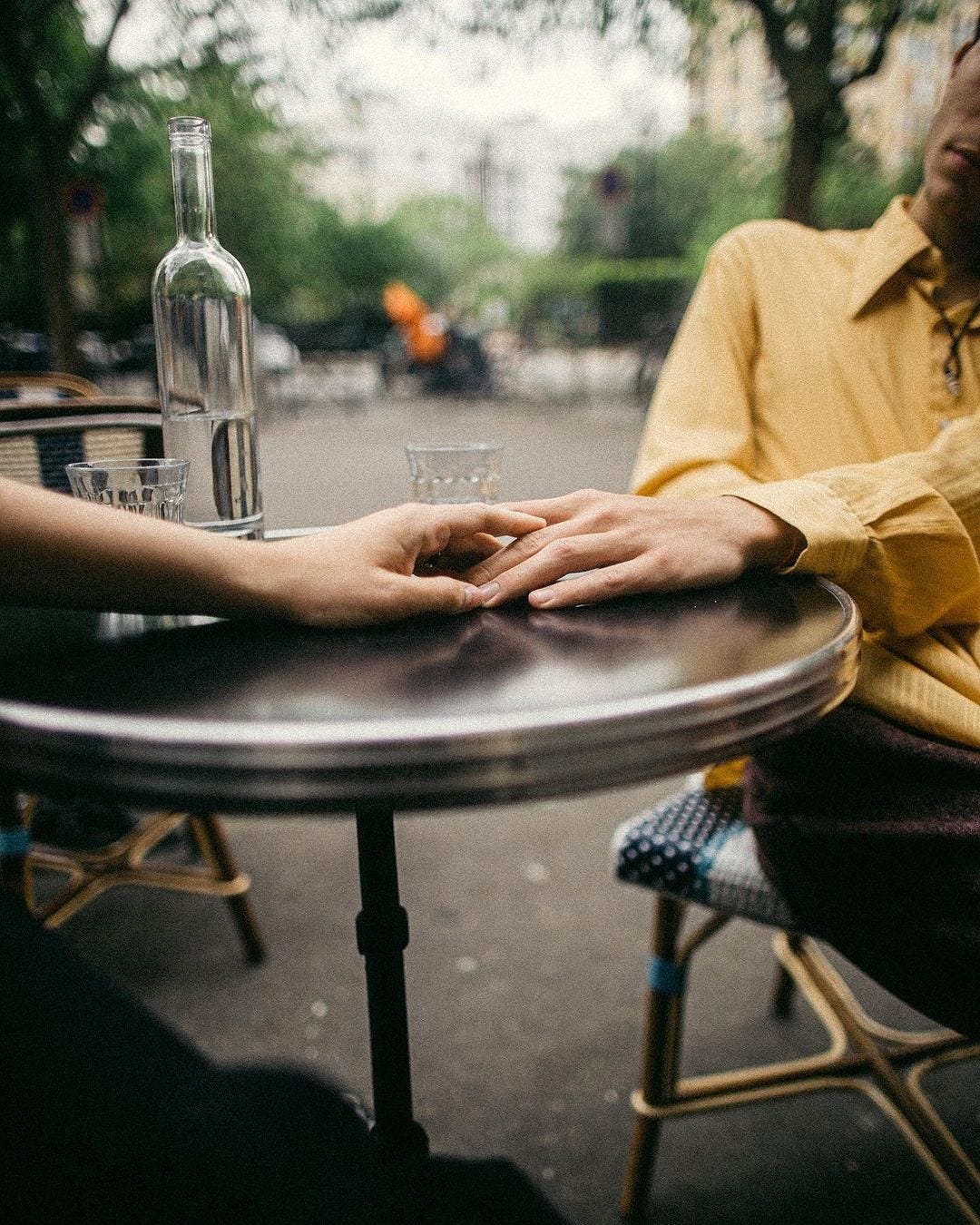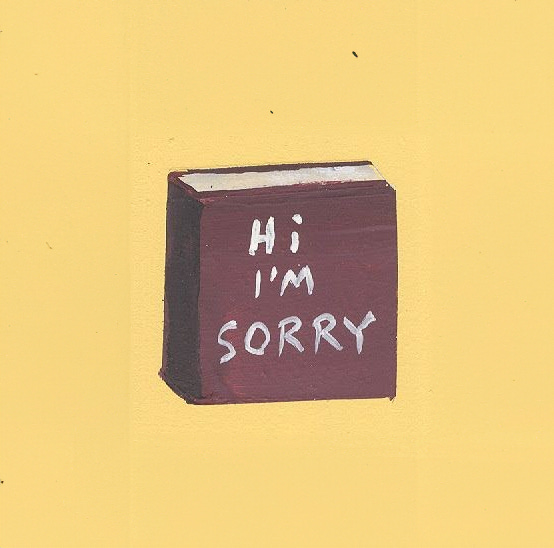Saying Sorry
The Under-appreciated Superpower We all Have
Hi, I'm Manuel Saez, 2x Founder, Award-Winning Designer, and Emotional Intelligence Coach 🌻 Here I Share the advice I wish I had while building my businesses ➜ I love fixing old motorcycles 🛵🏍️
A while back, I wrote about the art of apologizing, a how-to guide I originally wrote for myself but shared in case it helped someone else.
Lately though, I’ve been thinking more about that invisible force that keeps us from saying sorry when we know it is the right thing to do.
Because if we’re honest, most of us know how to apologize. We just don’t always want to because it is hard to go beyond our egos.
At least, that’s what I noticed about myself.
Apologizing was especially hard for me when I was younger, when I was trying to prove I was right all the time, when my ego was running the show.
I thought saying sorry was a sign of weakness.
Or worse, accepting blame for something I didn’t intend to cause. I figured if I didn’t mean to hurt someone, then I shouldn’t have to apologize.
And if I did mean it? I wasn’t going to backtrack.
Looking back, I see how much unnecessary distance that created in my relationships.
What I’ve come to learn is this:
Apologizing isn’t about being right or wrong; it’s about being human.
Recognizing the impact we have on others, even unintentionally, is one of the most generous things we can do.
I don’t want to make it sound like I’m perfect. Saying sorry is hard, and I don’t always get there right away.
Saying sorry takes work. It takes self-awareness to notice when I’ve hurt someone, humility to see things from their perspective, and courage to take responsibility for my part.
Controlling my ego isn’t easy, but I’ve learned that it’s at the core of emotional maturity and the foundation of every meaningful relationship in my life.
The Right Mindset to Say Sorry
Let’s start with the hard part: getting over yourself.
There’s no way around it; apologizing requires humility.
It means admitting that you’re not perfect, that you make mistakes, and that sometimes, your words or actions land in a way you didn’t expect.
That can be uncomfortable, especially if you’re someone who prides yourself on being self-aware, kind, or thoughtful.
But if you really think about it, that’s just your ego talking.
You can be a good person and still hurt someone.
I had to learn to be okay with “failing” by hurting people, even when I didn’t mean to.
I had to stop measuring my worth by how often I got things right. That mindset was a trap; it made it harder to own my missteps, and it made me defensive when someone pointed them out.
Now, I try to approach those moments with curiosity instead of shame.
If someone tells me I’ve hurt them, I pause. I check the impulse to explain myself or try to fix it right away. I try to just see it. I put myself in their shoes and imagine what it must have felt like on their end.
And then I say the words: I’m sorry, with honesty and empathy.
No disclaimers. No “buts.” Just: I’m sorry I hurt you. That wasn’t my intention, but I can see how it landed, and I want to understand.
That small shift, from defending your intention to recognizing your impact, can change everything.
Sometimes, I find it easier to write it down—to put into words what I’m feeling so I can understand it better myself. Writing helps me process my emotions and get clear on what happened.
And sometimes, when I share that writing with the person I’ve hurt, it helps them see me as a human, too. It softens the space between us and can begin to heal what was broken.
Apologies Build Strong Relationships
One of the biggest myths I believed was that if I apologized, I was admitting to being a bad person. Or being wrong. But that’s not how it works.
The people I respect the most are the ones who can acknowledge when they’ve messed up.
They don’t make excuses. They don’t disappear. They show up, take responsibility, and try to make things right.
Having people in your life who can own their mistakes and apologize is a blessing.
It’s at the core of every great relationship I’ve had, personal or professional. And I try to be that person, too. Not perfectly, but consistently.
If I hurt someone, even unintentionally, I want to know. Not because I’m trying to win points, but because I care about the connection.
Because repairing that rupture, however small, matters more to me than being right.
So How Do You Say Sorry—Really?
Here’s what I try to keep in mind:
Start with empathy. Before you say a word, try to understand what the other person has experienced. What might they have felt? What was the impact of your actions or words?
Own your part. Even if you didn’t mean to hurt them, you still can acknowledge the pain it caused. Impact is greater than intention.
Avoid excuses. If you catch yourself saying “I’m sorry if you felt that way” or “I didn’t mean to…”, stop. That’s not an apology, it’s a dodge.
Stay with the discomfort. Apologies aren’t meant to be clean or easy. Let it be messy. Let it be human.
Commit to learning. If the mistake came from something deeper, like stress, defensiveness, or old patterns, acknowledge that too. Say you’ll do better. And mean it.
Do it without expectations. Apologize because it is the right thing to do, not because you want the other person to react a certain way. Apologize even when the other person may not accept it.
It sounds simple. It’s not always easy. But it is worth it.
Apologizing Builds Trust
Here’s what I know now that I didn’t back then:
People don’t expect you to be perfect; they want to know they can trust you. Apologizing is at the core of building trust.
We’re all going to mess up.
We’ll miss a signal.
Say something in the wrong tone.
We’ll be distracted when someone needs our full presence.
We’ll bring our baggage into a conversation that wasn’t about us.
That’s just being human. What matters most is what happens next.
Do we shut down? Get defensive? Pretend it didn’t happen?
Or do we own it, face it, and say the words that open the door to connection again?
Saying sorry might not erase the hurt. But it tells the other person: You matter more to me than my ego.
And that’s a powerful thing to hear.
Sometimes, we need to apologize to ourselves, to our past selves whom we’ve judged harshly.
Sometimes, we need to say sorry to people who are no longer in our lives.
Sometimes, these are the apologies we need most, the ones that help us heal and move on.
A question for you.
Have you thought about apologizing to yourself or people in your past?
I’d love to hear if this essay got you thinking or if it’s prompting you to take that step to mend a relationship. Let me know.
Sending you good vibes 🌻
Manuel
manuelsaez.com






Apologizing shows accountability of the person. It reflects their deep understanding of how their actions made the other person feel. I cannot trust people who avoid taking ownership, and blame others instead of saying “I messed up. I’m sorry. Forgive me” and move on.
Manuel! I have enjoyed every line you wrote in this post! - such an important perspective of a life element “sorry”, thank you so much for this. You’ve just inspired me for my upcoming post topic.